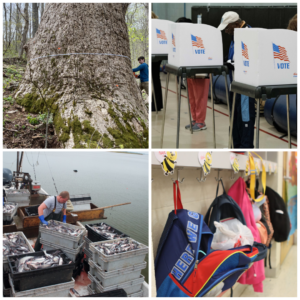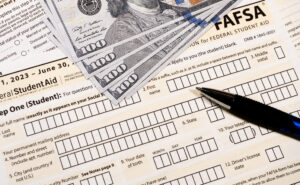5:27
News Story
As state works to improve special education, advisory committee wants to review parents’ complaints
Virginia’s special education advisory committee would like to learn more about the complaints made by parents of students with disabilities in hopes of improving special education services in the state, according to the committee’s September report.
The committee made the recommendation, along with a list of others — including funding special education based on based on the state funding formula and continuing ongoing training for families and using the new student evaluation tool — to the Board of Education, as the Virginia Department of Education (VDOE) and lawmakers continue working to improve services to special needs families and meet federal requirements.
Since 2019, the U.S. Department of Education has been investigating how Virginia handles special education disputes. The department previously determined that the state repeatedly failed to resolve complaints filed by parents and did not have “reasonably designed” procedures and practices to ensure a timely resolution process for those complaints.
A study by the Joint Legislative Audit and Review Commission, the state’s legislative watchdog, surveyed parents and found that they were not adequately informed of the state-level resources available to them for resolving disputes with their child’s school.
Samantha Hollins, an associate superintendent with VDOE, said given the increasing number of complaints, the Office of Dispute Resolution’s staff size has made it a challenge to meet the adjudication requirements set by the federal government.
The committee recommended that VDOE evaluate the proper staffing levels in the Office of Dispute Resolution and the Office of Program Improvement within the Department of Special Populations, which handle complaints to “ensure the increasing needs of families of children with disabilities requesting assistance can be met,” the report states.
The department should consider providing an annual summary in order to help the advisory committee perform its “statutorily required duty of identifying trends in the issues being raised by parents of students with disabilities in the commonwealth, the committee suggested.”.
VDOE and lawmakers have taken several steps to improve services for nearly 181,000 students with disabilities this school year, which coincide with the advisory committee’s recommendations.
The department created a system to oversee the development and use of individualized education programs (IEPs) for students with special needs. Educators are now required to undergo more training on providing inclusive special education instruction.
The board also adopted regulatory changes to how the state handles compliance complaints regarding students with disabilities and dedicated funds to examine the dispute resolution system, which has been criticized for failing to monitor and respond to complaints against school districts.
Teacher pipeline and funding
During the Sept. 26 presentation to the board, the committee also raised awareness about incentivizing and funding high school educator prep programs to develop a pipeline for potential special education teachers.
Virginia was one of a few states to receive a $6 million grant to expand its registered apprenticeship program for K-12 educators and create opportunities in the teaching profession. Last year, 28 school divisions launched registered teacher apprenticeship programs.
The committee also recommended that the department ensure that if a locality uses Virginia IEP and has optional add-ons, those comply with IDEA parent participation requirements, “specifically that parents are able to access their student’s information and increase their participation in the IEP process.”
The Individuals with Disabilities Education Act (IDEA) is a federal law that ensures students with disabilities receive a “free appropriate public education” and guarantees special education services.
Hollins said the department and governor’s administration are “actively” seeking additional resources to support some of the specialty modules. An allocation from the special education fund goes to the IEP process, but there is no dedicated fund to support it.
There’s also been recent evidence that Virginia has underfunded schools for years, leaving localities responsible for filling the gaps.
According to the JLARC 2023 study into K-12 funding, analysts found that the Standards of Quality formula, which helps the state determine how much funding schools need, estimated that fewer special education teachers are needed than actual staffing, and a workgroup of K–12 teachers, principals and other school staff concluded.
For fiscal year 2023, the funding formula calculated that 13,300 special education teachers were needed, which was 93% of the number employed by school divisions and 66% of what practitioners estimated was required.
State analysts recommended lawmakers require the VDOE to work with school division staff and experts to develop new special education staffing need estimates based on a review of current ones.
Analysts also suggested the legislature amend state law to replace the funding formula calculations for special education and English as a second language students, including any associated calculations for benefits and payroll taxes under the Standards of Quality, with student-based funding calculations based on actual average school division expenditures.
Lawmakers formed a joint subcommittee to review and transform the state’s funding formula, which could take a while.
The subcommittee will vote on a work plan at its Oct. 31 meeting.
YOU MAKE OUR WORK POSSIBLE.
Our stories may be republished online or in print under Creative Commons license CC BY-NC-ND 4.0. We ask that you edit only for style or to shorten, provide proper attribution and link to our website. AP and Getty images may not be republished. Please see our republishing guidelines for use of any other photos and graphics.





